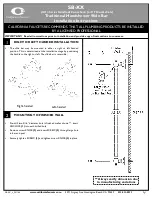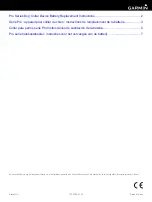
Equipment Effect". To achieve this, spend a few minutes each day, for three days, completing the
following before actual training begins.
Creating the "Dummy Equipment Effect"
Remember at this point in the training process the battery
should not be inserted in the remote transmitter. Choose a
food reward that your dog finds very desirable and that he
will accept every time. The size of this food reward should
be small (about the size of a pencil eraser) since your dog will
be receiving quite a number of these during the introductory
phase.
Show your dog the remote transmitter and let him smell it.
As soon as he does, give him one food reward. Repeat this 3
to 5 times, being sure to make the situation a little different
each time.
Also, be sure that you also point the remote transmitter at
him numerous times throughout the day. Each time you
point it, push the buttons. Each time you complete this,
follow it with a food reward. Once again, the batteries
should not be in the remote transmitter during this procedure.
Complete this exercise numerous times each day for three consecutive days. Continue the food reward
when you point the remote transmitter at him. Try and carry the remote transmitter with you the entire
day. You must get used to having the remote transmitter with you when your dog is wearing the collar.
The belt clip on the remote transmitter will help achieve convenient access. The batteries should not be
placed in either the remote transmitter until day four of training. The first day that your should start
training with an activated remote transmitter.
The first training situation
Be sure you have fresh batteries in both the receiver collar and the remote transmitter. Carefully choose
the first situation in which the remote transmitter is going to be used. This situation should be one
in which your dog will easily learn, i.e., one with few distractions. Your dog must learn that one of
his behaviors will potentially produce a warning or a correction. If you first train in a situation with
distractions, your dog may not associate the warning tone or the correction with his behavior, but with
something else. For example, if your dog receives the correction when he is jumping on, and looking
at a visitor to your home, he may perceive the visitor as being the cause of the correction, instead of his
inappropriate jumping behavior.
The initial training situation should also be one in which you will be relatively close to your dog when
he receives his first few corrections. This allows you to observe your dog’s first few reactions to the
correction, determine if the remote transmitter is functioning properly, and if he actually does receive the
correction.
Train your dog only in this initial situation until he has learned what the consequence is. Only then
should you move on to the next situation or problem behavior. This will help ensure that your dog
understands that there is one particular behavior he must avoid, no matter what the reason for his
displaying the behavior. Over time, he will learn that there are several behaviors that he must avoid.
Setting the correction level
Before you correct your dog for the first time, be sure you have set the correction level to the lowest level.
16







































